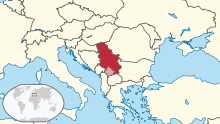Homosexuality in Serbia

Homosexuality in Serbia tends to meet with rejection in society. Since 2011 there has been controversy over the Belgrade Christopher Street Day (CSD). Since 2017, the country has had an avowed lesbian head of government in Ana Brnabić .
Legal situation
legality
Homosexuality has been legal in Serbia since 1994 . The age of consent has been uniformly adjusted to 14 years since 2006.
Anti-discrimination laws
Discrimination based on sexual orientation has been prohibited by law since 2009 . Homosexual people can serve in the military.
Recognition of same-sex partnerships
Same-sex marriage and registered partnership are not legally permitted in Serbia . The state has not yet officially recognized same-sex couples.
Social situation
Mostly negative attitude towards homosexuality
Information about the attitudes of the population towards homosexuality vary in some cases, but generally suggest a rather negative attitude:
- According to information from the newspaper Die Presse from 2008, 70 percent of Serbs classify homosexuality as a disease, 60 percent even as a “sin”. 50 percent demanded that the state suppress same-sex love.
- According to ARD data from 2014, every second person in Serbia considers homosexuality to be an illness. This attitude is also still widespread in the police.
- According to the 2017 newspaper The Guardian , 65% of Serbs believe that homosexuality is a disease. 78% are of the opinion that homosexuality should not be shown in public.
Controversy over Christopher Street Days
A gay community can be found primarily in the capital Belgrade . A CSD has been held there every year since 2005.
In 2011, 2012 and 2013 this event was banned by the then Prime Minister Ivica Dačić on the grounds that the safety of the participants could not be guaranteed after homophobic threats of violence by right-wing extremists and hooligans . The event was also criticized by the Serbian Orthodox Church . Internationally, critics saw the ban as "buckling" in the face of homophobic violence, and the European Union asked Serbia to allow the event in the following years.
In 2014 the CSD took place again, in a few hundred meters long parade march, around 1000 lesbians and gays, some ministers of the Serbian government and numerous diplomats including the German ambassador Heinz Wilhelm took part.
Others
In 2014, a German participant in a conference for LGBT rights in Belgrade was beaten up and seriously injured.
In 2017, Ana Brnabic, an avowedly lesbian politician, became the country's head of government.
See also
Web links
- Gayten LGBT in Serbia
- LGBTt Alliance , based in Belgrade
- Spiegel TV about the CSD 2010 , October 11, 2010
Individual evidence
The situation of homosexuals in Kosovo , which is still part of Serbia under current UN law, is dealt with in the article Homosexuality in Kosovo .
- ↑ Queer.de: Serbia adopts anti-discrimination law , March 27, 2009
- ↑ ILGA Europe: The Serbian Anti-discrimination law is adopted ( Memento of the original from October 3, 2009 in the Internet Archive ) Info: The archive link has been inserted automatically and has not yet been checked. Please check the original and archive link according to the instructions and then remove this notice. , March 26, 2009
- ^ Ex-Yugoslavia: homosexuals as targets . In: The press . ( diepresse.com [accessed November 28, 2017]).
- ↑ - ARD Studio Vienna: Homophobia in Serbia - Discussion about the “Pride” parade | ARD Vienna / Southeast Europe . ( ard-wien.de [accessed on November 28, 2017]).
- ^ Andrew MacDowall: Serbia gets its first female - and gay - prime minister . In: The Guardian . June 15, 2017, ISSN 0261-3077 ( theguardian.com [accessed November 28, 2017]).
- ↑ Queer.de: Belgrad Pride on information tour , December 3, 2003
- ^ Deutsche Welle: CSD banned in Belgrade
- ↑ queer.de: Belgrade CSD banned again
- ↑ Homosexual parade under police protection: Belgrade allows “Pride Parade” | tagesschau.de. (No longer available online.) September 28, 2014, archived from the original on September 28, 2014 ; accessed on November 27, 2017 . Info: The archive link was inserted automatically and has not yet been checked. Please check the original and archive link according to the instructions and then remove this notice.
- ↑ Tagesschau.de: German seriously injured in attack ( Memento from September 14, 2014 in the Internet Archive )
- ↑ Keno Verseck: Homosexual Prime Minister Brnabic: Serbia argues about this woman . In: Spiegel Online . June 17, 2017 ( spiegel.de [accessed November 27, 2017]).
